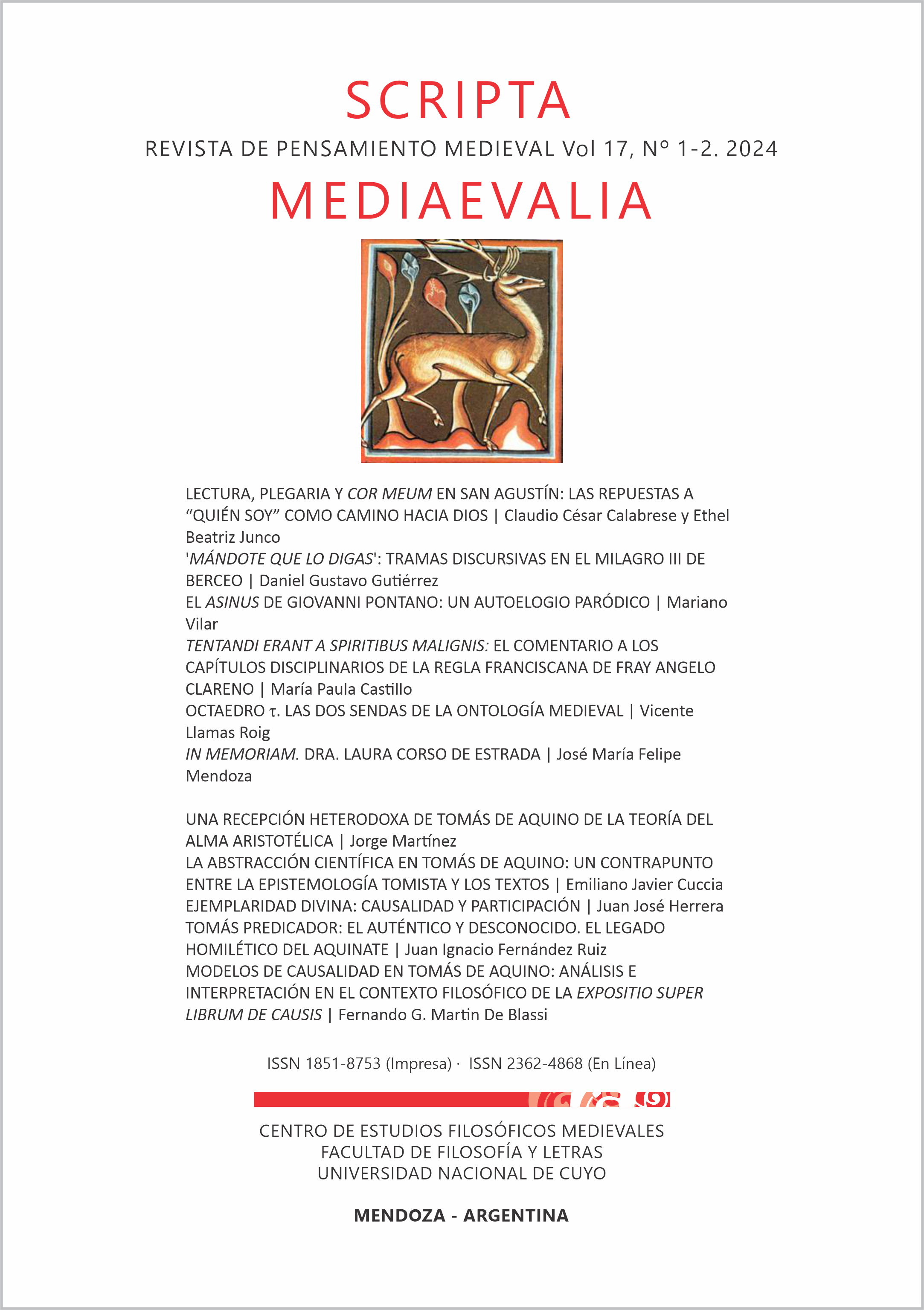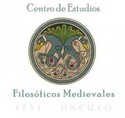Reading, prayer and cor meum in Saint Augustine
The answers to “who am I” as the way to God
DOI:
https://doi.org/10.48162/rev.35.034Keywords:
Saint Augustine, Christian philosophy, Neoplatonism, PrayerAbstract
We start from the idea of purpose that St. Augustine gives to reading the sacred text and to writing his interior life in terms of autobiography and conversion and, therefore, we postulate that the act of reading leads him to seek wisdom. If this is the measure that gives coherence to his search, we must modulate its scope: reading and praying are intimately linked and are the beginning of his conversion and philosophical reflection, to the point that reading becomes prayer and the key to developing his thought. In this sense, we work on the one hand, on the “now of the heart” and, on the other, on the way in which reality exists. We will also stop to consider the characteristics of praying and thinking of “a man”; thus, St. Augustine presents his interiority and his thought through the semantic field cor and the treatment of time and memory, which leads him to reflect on the meaning of his life.
References
s. Augustin. “Les Confessions”. En Oeuvres de Saint Augustin. Vol. XIII y XIV. Editado por E. Solignac. Paris: Desclée de Brouwer, 1962.
s. Augustin. Confesiones. Traducción y notas por Silvia Magnavacca. Buenos Aires: Losada, 2005.
s. Augustin. Sancti Aureli Augustini: Soliloquiorum libri duo. En Opera sect. I Pars IV. Editado por Wolfgang Hörmann. Vindabonae: Hoelder-Pichler-Tempsky, 1986.
s. Augustin. Contra Faustum Manichaeum Libri Triginta Tres. http://www.augustinus.it. Última fecha de acceso 2/06/2023
s. Augustin. In Evangelium Ioannis Tractatus Centum Viginti Quatuor. http://www.augustinus.it 2/06/2023
s. Augustin. Contra litteras Petiliani donatistae libri tres. http://www.augustinus.it 2/06/2023
Bélanger, Steeve. “La prédication augustinienne et les relations pagano-chrétiennes durant l’Antiquité tardive”. Cahiers des études anciennes 43 (2020): http://journals.openedition.org/etudes anciennes/609.
Calabrese, Claudio. “San Agustín y las transformaciones de la mirada escéptica. La figura de Proteo en Contra academicos”. Veritas 45 no.4 (2020): 121-140.
Consolino, Franca Ela. “Interlocutore divino e lettori terreni: la funzione-destinatario nelle Confessioni di Agostino”. Materiali e discussioni per l'analisi dei testi classici 6 (1981): 119-146.
Gadamer, Hans George. Wahrheit und Methode. Grundzüge einer philosophischen Hermeneutik. Tübingen: C. B. Mohr / Paul Siebeck, 1990.
García Álvarez, César. “El helenismo o la búsqueda del ‘otro’”. Byzantion Nea Hellás 37 (2018): 121- 141.
Gilson, Étienne. Introduction à l’étude de saint Augustine. Paris: Libraire Philosophique J. Vrin, 2003.
Jauss, Hans Robert. Literaturgeschichte als Provokation. Frankfurt: Suhrkamp, 1970.
Lacoste, Jean-Yves. Expérience et Absolu. Questions disputées sur l’humanité de l’homme. Paris: PUF, 1994.
Lejeune, Philippe. Le pacte autobiographique. Paris: Le Seuil, 1975.
Marion, Jean-Luc. Au lieu de soi. L’approche de Saint Augustin. Paris: Presses Universitaires de France, 2008.
Marrou, Henri-Irénée. L’Église de l’Antiquité tardive (303-604). Paris: Seuil, 1985.
del Olmo Ibáñez, María Teresa. Teoría de la Biografía. Madrid: Editorial Dykinson, 2015.
Pellegrino, Michelle. Le “Confessioni” de Sant’Agostino: studio introduttivo. Roma: Studium, 1972.
Pérez-Amezcua, Luis Alberto y Junco, Ethel. “Alternativas para el fin del mundo: mito, destino trágico y ciencia ficción”. Amaltea. Revista de mitocrítica, 12 (2020): 37-45.
Pieri, Bruna. Narrare memoriter, temporaliter dicere. Racconto e metanarrazione nelle Confessioni de Agostino. Bologna: Pàtron, 2018.
Riggs, Peter J. “Contemporary Concepts of Time in Western Science and Philosophy”, en Long History, Deep Time. Deepening Histories Place, editado por Ann McGrath y Mary Ann Jebb, 47-66. Australia: The Australian National University Press, 2015.
Schrijvers, Joeri. “Jean-Yves Lacoste: A Phenomenology of Liturgy”. The Heythrop Journal 46 (2005): 314–333.
Schröder, Bianca-Jeanette. Titel und Text: Zur Entwicklung lateinischer Gedichtüberschriften. Mit Untersuchungen zu lateinischen Buchtiteln, Inhaltsverzeichnissen und anderen Gliederungsmitteln. Berlin/New York: Walter de Gruyter, 1999.
Trouvé, Alain. “L’arrière-texte: de l’auteur au lecteur”. Poétique 164 no. 4 (2010): 495-509.
Von Scheglmann, Ludwig. “Der Subjektzirkel in der Psychologie Augustins“. Zeitschrift für philosophische Forschung 22 (1968): 327-344.
Downloads
Published
How to Cite
Issue
Section
License

This work is licensed under a Creative Commons Attribution-NonCommercial-ShareAlike 3.0 Unported License.






































